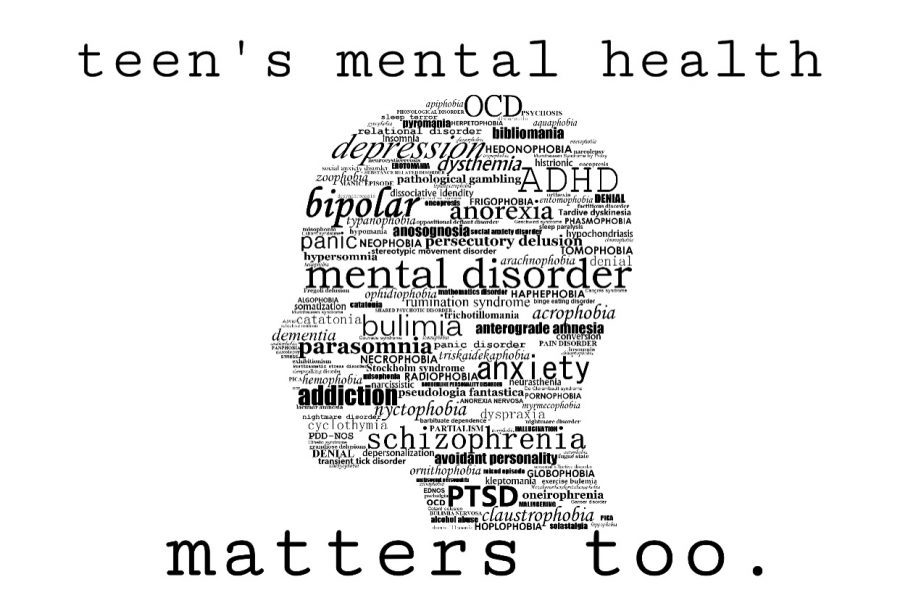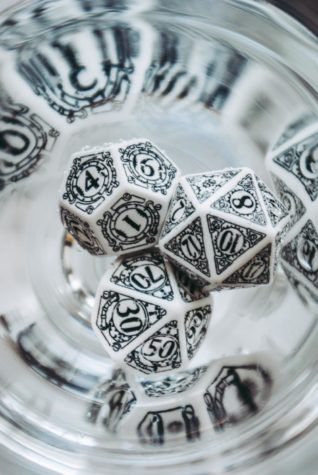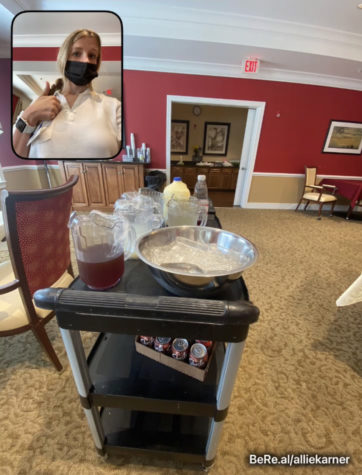Teenagers Struggle with Mental Illnesses, too.
November 17, 2020
Keeping a mental state stable when burdened with stress is difficult, especially for teenagers. The overload of school, family life, social life, extracurriculars and many times, a job, isn’t something the average person can healthily balance. It’s even harder for a child to deal with. Many teens become overworked into a mental illness.
Having to deal with mental issues along with everyday responsibilities is difficult. Often, teenagers aren’t provided an outlet or solution to help with their mental health. It becomes a battle they have to fight by themselves.
Many times, teenagers who have mental disorders obtained them hereditarily. Take Toby Poole as an example.
Toby Poole is a teenager diagnosed with Bipolar I. He spoke about his battle with mental illness.
“I’ve had it since I was young,” he said. “It’s biological. My reaction to finding out wasn’t great. I freaked out, started getting paranoid about little things and made it worse for myself.”
Poole’s mental health puts a big strain on his life. “When I’m manic, I feel like sometimes I can’t think about anything else except for whatever my mind decided to fixate on. I don’t pay attention, I zone out, I end up not doing homework. Depressive episodes leave me completely unmotivated, on the other hand. I can’t bring myself to put effort into anything or find a reason to even try in school.”
For some, being prescribed medication for their mental illnesses is really helpful. For others, it’s quite the opposite.
To Poole, medication is anything but helpful.
“I was prescribed mood stabilizers in order to attempt to avoid mania and depressive episodes. They tend to make me feel numb, uninspired and bored.” he said.
This is a common feeling for plenty of people who’ve been prescribed antidepressants or other medications to treat their mental illnesses. In plenty of situations, medications for mental illnesses remove the negative feelings, and provides a sort of empty feeling. Some teens are unable to be diagnosed/provided medication.
Poole provided inspirational advice for those struggling with undiagnosed Bipolar Disorder.
“This is really gonna suck, trust me. You’re going to end up regretting a lot of impulsive actions and wonder how your mind even managed to get you in some positions, but this is just how it goes. It’s frustrating, and I know that sometimes crashing from mania can leave you feeling hollow, but there is hope for you. You aren’t your bipolar disorder. You are strong, you are brave, and you can do this, even if you can’t get the treatment you need. I believe in you.” Poole said.
According to teenmentalhealth.org, 1 in 5 adolescents have a mental illness. Health care officials are barely concerned about the people’s mental health, as only 4% of the total health care budget goes toward mental health reasons.
Due to the lack of useful resources, struggling teens often have to take matters into their own hands.
Having healthy coping mechanisms and positive pastimes is a key step to dealing with a mental illness. Many teens who struggle with a mental illness find things like journaling helpful when feeling down.
Jennifer Cabrera is a teenager diagnosed with depression. She has found coping mechanisms that help when she feels down.
“Music definitely helps me, as well as writing down certain triggers, how I’m feeling or memories.” Cabrera stated.
The severity of mental illnesses in teens is often overlooked because of their age. For people like Cabrera, mental illness puts a restraint on life itself.
“There’s days where I literally can’t move or think about doing anything. Not eating nor talking to my family. Periods of time where I can’t even work because it’s too much for me.” Cabrera said.
Cabrera also added that her depression makes it more difficult to handle basic responsibilities, like school.
Half of all mental health conditions start by 14 years of age, but most cases are undetected and untreated, stated by the World Health Organization.
Roxanne Andromeda, a teenager struggling with undiagnosed Borderline Personality Disorder gave insight on her feelings.
“BPD causes you to have really high highs and really low lows,” Andromeda said. “So, when my family gets into fights, it makes it harder for me to manage my emotions.”
Plenty of times, the parents/guardians of teenagers will continuously sweep aside their child’s mental state. It prevents the child from getting medication that could potentially benefit their mental health.
Andromeda said that her family held her back from being diagnosed with BPD.
“My family took me out of therapy and tried to rebuttal with my doctor every time, even though he has noticed my behavior,” Andromeda explained.
For several teenagers, including Andromeda, a disastrous mental state affects their physical well-being, too.
“If I’m really feeling low, I may not leave my room, which means no showering, changing clothes, eating, etc.”
A situation like Andromeda’s is far too relatable for many teenagers. While others may see it as “gross” and “lazy” it’s, unfortunately, an uncontrollable part of life for many people.
Most teenagers have a hefty amount of responsibilities to take care of. Having a mental illness along with that can be crippling. In many cases, stress can exacerbate a mental illness.
As reported by the World Health Organization, suicide is the third leading cause of death in teenagers aged 15-19. This is simply one of many reasons why the mental well-being of teenagers needs to be much more prioritized than it is.
The teenagers of today are the future. It’s not too late to spread awareness and provide stronger support for them.












John • Nov 18, 2020 at 6:46 am
Could be better a
ahlaysha • Nov 17, 2020 at 8:42 pm
this is really good !!! keep up the good work.